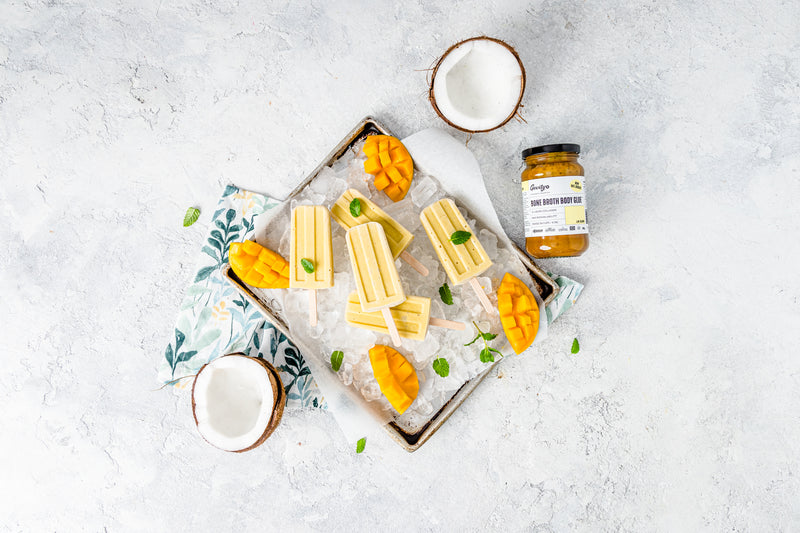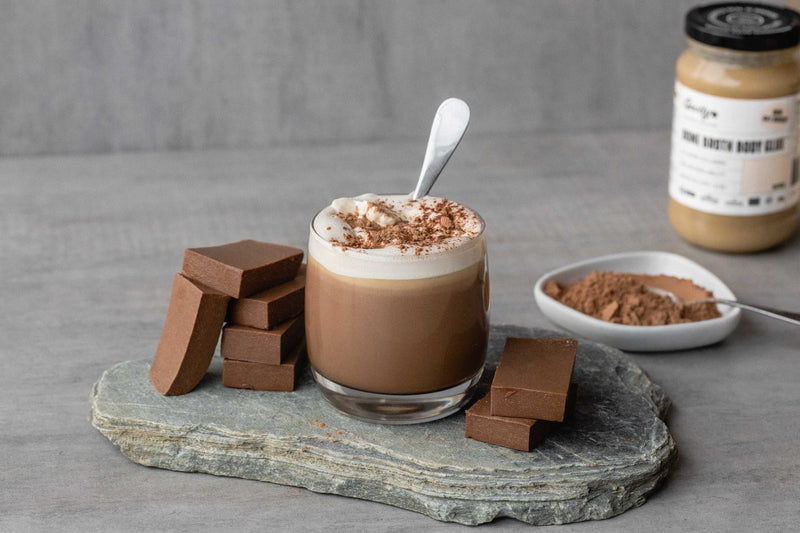The silly season is well and truly underway and with 2020 being such a challenging year, extra celebrations may be needed!! As much as we all love to have a good time, no one likes the sluggish feeling we experience after indulging in too many alcoholic drinks and unhealthy foods this time of year.
At Gevity Rx, our motto is NO COMPROMISES - on ingredients, standards and taste. We pride ourselves on ONLY producing products that are 100% good for you but we know that at this time of year it can be hard to avoid temptation. So to help you negotiate the fun and foods of the festive break whilst protecting your gut structure we put together a few of our fav health swaps.
1. Swap stress more to stress less (whenever you can).
From Christmas shopping to entertaining relatives to food preparation, we know this time of the year can be stressful to say the least. Unfortunately, excess stress has a huge negative impact on gut health. The Hypothalamus, pituitary and adrenal gland (HPA) axis, our autonomic nervous system and vagus nerve connect our brain, feelings and emotions to our digestive system. Changes on how you feel have now been proven to directly affect functionality of the gut: increased permeability of epithelial tissue (increasing risk for immune reactions), insufficient secretion and production of digestive enzymes (contributing to higher risk of pathogenic attacks, and inadequate food digestion and absolution), and overall post meal discomfort (due to inadequate digestion).
QUICK FIXES ?
- Take 5 minutes to relax prior to eating a meal
- Avoid eating whilst completing other tasks (e.g. work emails, driving, or watching tv).
- Meditate for a few minutes a day
- Try swapping a high intensity gym session for a yin yoga stretch session.
Unfortunately a lot of common takeaway, restaurant foods and condiments we use during this time of the year are made using nasty industrialised seed oils. Industrialised seed oils require heavy mechanics and chemical processes to be manufactured. These oils are super inflammatory, are most likely to damage your gut lining (due to increased inflammation, and increased gut permeability), and will negatively affect your metabolism. Olive oil on the other hand tastes delicious, is made 100% naturally (choose reputable brands to ensure quality), and is so good for your! We explain all details why we only use extra virgin olive oil in Gevity sauces in previous articles. (needs link)
EXPERT TIP: Next time you dine out or order takeaway, ask the restaurant if your food can be cooked in 100% olive oil or grass fed butter. Request ingredients and make the swap from unhealthy sauces to our awesome Bone Broth Sauces.
3. Swap high sugar alcoholic drinks for low carb alcoholic drinks. For optimal gut health, it’s best not to drink alcohol, but you can make some better choices this Christmas to prevent inflammatory responses and still be merry! For wine lovers, your best choice is clean, high quality spirit or organic wine. Those who love spirits,vodka + lime and soda/sparkling water is another great choice!
4. Swap high carbohydrate meals for high prebiotic fibre, low carbohydrate meals.
Providing high prebiotic content to your healthy and metabolic active gut bacteria is one of the only salvation you may have during the silly season. Since many of the food and alcohol choices we make during this time of the year are in favour of unhealthy gut bacteria, we must care and support the bacteria that will keep you metabolic active and feed them very well.
What are these foods? All green, dark colour vegetables, and spices and herbs like: capsicum, onion, garlic, peppers, chilli, coriander, parsley, turmeric. Low carbohydrate fruits like berries are also included in this list, as well as coffee. Yes that’s right black coffee or healthy fat rich Bulletproof coffee are also in the gut friendly list.
5. Swap high fat and hard to digest proteins to more readily absorbable protein sources.
Most likely this time of the year most of us are consuming way more than our daily recommended calorie intake. Excess calories may not only cause negative effects to our body composition, but also for our gut. Excess calorie consumption, when combined with poor quality fat and protein = high inflammatory response everywhere. Whenever inflammation is present, our gut functionality is on defence mode, meaning that optimal metabolism and absorption of foods you eat isn’t happening optimally either.
What to do? Improve the quality of foods you eat by:
- Choosing grass fed and finished over grain fed and buying organic whenever you can
- Eating seafood and wild caught fish instead of chicken and pork (which are high in omega 6 pro-inflammatory fatty acids)
- Including a whole bunch of high antioxidants vegetables with all meals.
EXPERT TIP: Consume a cup of Gevity Rx Body Glue prior your meal out to enhance protective effects of glycine and lysine!
We hope these basic tips help you to enjoy your holidays with your family and friends, whilst protecting your health as much as possible.
Written by Gevity Guru, health expert Elza Bevilacqua
Sources:
Appleton J. (2018). The Gut-Brain Axis: Influence of Microbiota on Mood and Mental Health. Integrative medicine (Encinitas, Calif.), 17(4), 28–32.
Cardona, F., Andrés-Lacueva, C., Tulipani, S., Tinahones, F. J., & Queipo-Ortuño, M. I. (2013). Benefits of polyphenols on gut microbiota and implications in human health. The Journal of nutritional biochemistry, 24(8), 1415–1422. https://doi.org/10.1016/j.jnutbio.2013.05.001
Fritsche K. L. (2015). The science of fatty acids and inflammation. Advances in nutrition (Bethesda, Md.), 6(3), 293S–301S. https://doi.org/10.3945/an.114.006940
Holscher H. D. (2017). Dietary fiber and prebiotics and the gastrointestinal microbiota. Gut microbes, 8(2), 172–184. https://doi.org/10.1080/19490976.2017.1290756
Jensen, T., Abdelmalek, M. F., Sullivan, S., Nadeau, K. J., Green, M., Roncal, C., Nakagawa, T., Kuwabara, M., Sato, Y., Kang, D. H., Tolan, D. R., Sanchez-Lozada, L. G., Rosen, H. R., Lanaspa, M. A., Diehl, A. M., & Johnson, R. J. (2018). Fructose and sugar: A major mediator of non-alcoholic fatty liver disease. Journal of hepatology, 68(5), 1063–1075. https://doi.org/10.1016/j.jhep.2018.01.019
Markowiak, P., & Śliżewska, K. (2017). Effects of Probiotics, Prebiotics, and Synbiotics on Human Health. Nutrients, 9(9), 1021. https://doi.org/10.3390/nu9091021
Merino, B., Fernández-Díaz, C. M., Cózar-Castellano, I., & Perdomo, G. (2019). Intestinal Fructose and Glucose Metabolism in Health and Disease. Nutrients, 12(1), 94. https://doi.org/10.3390/nu12010094




